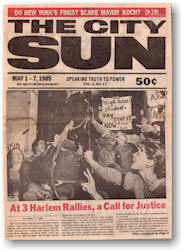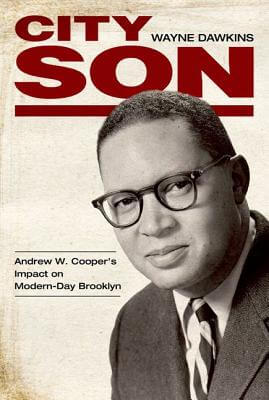Book Review: City Son: Andrew W. Cooper’s Impact On Modern-Day Brooklyn
by Wayne Dawkins
Nonfiction, Hardcover, 304 pages
More Info ▶
Book Reviewed by Robert Fleming
So many African-American newspapers and publications have vanished from view, but their impact remains on the psyche of our community. New York City‘s now-defunct newspaper, City Sun, is one of these media shadows yet its influence lives on in its determined writers, their timely topics, and its politically committed publisher, Andrew W. Cooper (1927-2002). It is his story that Wayne Dawkins, assistant professor of journalism at Hampton University, tells so dramatically in this biography, which is packed with revealing details about the rise and fall of this paper intertwined with its creator‘s bold vision.
With a sensitivity befitting a media legend like Cooper, Dawkins depicts his Harlem childhood with a World War I vet father and a mother from Charleston, South Carolina in the 1920s, relocating later to Brooklyn. The biographer recalls the excitement of Black New York, where cultural and political activism was surging, and the young Cooper was a product of his times. A bookworm and mature beyond his years, he found work during the Second World War as a Navy Yard employee, delivering messages and serving meals.
Flash forward to Cooper‘s meeting with Jocelyn Clopton, who later became his wife in 1949, and a major influence in the soon-be journalist‘s life. Cooper‘s work history went from a bank clerk to an owner of a Harlem eatery, “Andy‘s Coop,” which closed shortly and a Brooklyn beer company hired him. He ran for state senator. Years later, Cooper sued state officials in a case, Cooper vs. Power, challenging the political status quo by demanding the right to elect a representative of their Black community. In 1968, in the wake of Cooper‘s lawsuit, New York‘s 12th Congressional District was redrawn, providing Shirley Chisholm an opportunity to become the first Black woman to take a Congressional seat.
 Dawkins‘s account of Cooper gains momentum when the biographer details
his political involvement in Central Brooklyn which lead to his embrace of
journalism, becoming a political columnist for The Amsterdam News, and later
founder of Trans News Service and the Brooklyn weekly, City Sun. Cooper‘s
newspaper steers clear of the mainstream racism of the white city dailies
and the oppressive tyranny of the Koch regime. Sometimes the paper went
against the passive, stodgy old-boy Black political machine, taking on a
militant tone in the controversial events of the day such as the Howard
Beach racial killing, the Tawana Brawley rape case, and the Crown Heights
riot.
Dawkins‘s account of Cooper gains momentum when the biographer details
his political involvement in Central Brooklyn which lead to his embrace of
journalism, becoming a political columnist for The Amsterdam News, and later
founder of Trans News Service and the Brooklyn weekly, City Sun. Cooper‘s
newspaper steers clear of the mainstream racism of the white city dailies
and the oppressive tyranny of the Koch regime. Sometimes the paper went
against the passive, stodgy old-boy Black political machine, taking on a
militant tone in the controversial events of the day such as the Howard
Beach racial killing, the Tawana Brawley rape case, and the Crown Heights
riot.
Throughout the newspaper‘s abbreviated run of 1986-1996, Cooper, named “Journalist of The Year” by the NABJ in 1987, kept his finger on the pulse of the city, culturally and politically, and on the world stage. Some of the writing talents on its staff are notable for their contributions elsewhere: Utrice C. Leid, Armond White, Hugh Hamilton, Errol Louis, Peter Noel, Anthony Carter Paige, Simone Joye, and Dawkins.
As a project started in 2005 upon request by Cooper‘s widow, Dawkins gives the reader an intimate, candid look at this remarkable man and his dedicated personal mission to speak truth at all costs. It‘s a first-class effort, revelatory, courageous, and satisfying.

